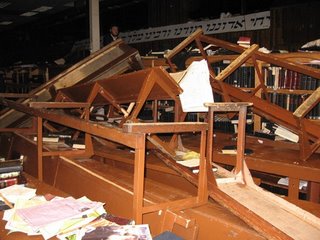Getting Tough with Yeshiva Bullies
The following story first appeared at The Blog of Author Clifford Meth:
After two years of public school, my 12-year-old begged me to return him to yeshiva where he felt he'd be surrounded by like-minded children and have an opportunity for a more robust social life. My assessment--not his. He just said, "I really want to go back." So I sent him to the Joseph Kushner Hebrew Academy.
Although they market themselves as "Orthodox," religiously speaking, JKHA is a Conservadox enclave located kitty-corner to the prestigious Newark Academy in Livingston, NJ. Two of my sons had already graduated from there, so I knew pretty well what I was getting myself into: an amalgam of mild-tempered, black-hat teachers who are serious about limudei kodesh (religious studies), and a constituency of upper-middle-class moderdox children from West Orange, as well as a swarm of moneyed brats from Livingston's uppercrust--children raised by nannies who boast of bringing trefos to school. Better this than public school where the drug problems are even greater than when I attended schools in this same district. Better this than the violence a relatively quiet and gentle boy would be subjected to by the unwashed masses.
Or so I thought.
Beginning in September, my son began returning home a little more despondent each day. "What's wrong?" I'd ask. "Is the work too difficult?" That was certainly easy to imagine: A dual curriculum is challenging enough for a boy that finds school easy, let alone one who struggles. "No," he'd say, eyes downcast. "Is it a teacher?" I asked. "Was someone nasty to you?" He'd just shake his head. Weeks of this. Months. I chalked it up to his being the new kid. He was just feeling overwhelmed.
Or so I thought.
It was my son's mother who finally caught a glimmer of what was happening. Like me, she'd been fishing about for months, going as far as to contact the school. One evening, while she studied with him, he admitted that he'd become the target of the class bully. Imagine my chagrin as the information reached me. I ascertained that the bullying--which began with one boy but had now spread to this boy's associates--had been confined to verbal abuse. Not that this hurt any less, but verbal is, after all, just verbal. You're too stupid to be in this class...Why are you here? No one likes you... You don't have any friends.
It wasn't entirely true. My son did have friends--two of the newer boys befriended him on day one. But as the charismatic bully's reign spread, these other little boys had been coerced away from my son. "They're on his side now," he told me. "And who is on your side?" I asked. "Just me," said my son.
His mother visited the school and registered an official complaint. I also called and spoke with the rabbi in charge of discipline. I warned him that he was sitting on a time bomb--that it was just a matter of time before things escalated. "Fear not," he assured me. "I've already spoken to the boys." "I have no fear, rabbi," I said, "but not because you've spoken to the boys." "Please," he said, "don't worry about anything. Everything is under control."
Or so he thought.
A week ago, push came to shove. The verbal taunts had devolved into physical abuse. A trip here, a shove into a locker there. When I discovered the escalation, I gave my son a facts-of-life sitdown. "This won't end," I told him, "unless you end it." "How?" he asked. "You have to take out their leader." He looked down. "Are you afraid of him?" I asked. "No," he said. "Then what are you afraid of?" He thought about it. "I'll get suspended," he said. "And everyone will hate me." "They already hate you," I said. "They hate you because they think you're weak." "I'm not weak," he said. "I'm stronger than he is." "But you've let him turn you into his entertainment. That makes you weak in everyone else's eyes. Once they think you're a wounded animal, the sharks begin to circle. Even littler kids will start taunting you." "That's already happening," he said. "Take out their leader," I repeated."
That afternoon, my boy sent me an instant message. "Done," it said.
I jumped in my car and drove to the school. Walked straight into the principal's office. There was the principal, the school shrink, and the rabbi I'd spoken with a month earlier. I looked at my son. "Not a mark on you," I said, looking him up and down. "Guess you won."
"Mr. Meth," said the principal, "do you have any idea what just happened here?"
"I'll take an educated guess," I said. "There's either a boy in the nurse's office or he's on his way to the hospital." No one smugs like a father scorned.
"This is a very serious issue," said the principal.
"I couldn't agree more," I said. "Your administration is guilty of gross negligence. That's about as serious as it gets." I wasn't posturing--my pal Leo Klein of the New York Bar Association had secured a top criminal lawyer for me out of Morristown, a former prosecutor who saw so much merit in my son's story that he was willing to take the case pro-bono. I was ready to hit the yeshiva in the belly with a serious complaint if they pushed me too far.
"We can't condone fighting, Mr. Meth," said the rabbi--the one I'd put on notice four weeks earlier. "We're going to have to suspend your son for a day."
"That's what I was hoping," I said. "It will give him time to play with his new X-Box -- the one I'm buying for him as a reward for taking out the bully. I'm not going to let him feel punished for even one moment."
"We need to understand why he did this," said the shrink, a pretty little gal that I wouldn't have minded knowing under other circumstances.
"Look no further," I said, suppressing a wink. "I'm the reason. I and no angel. I and no seraph. It was I who struck down the bully."
"We thoroughly abhor violence," said the principal, a middle-aged woman with delusions of eloquence.
"You're actually speaking to someone who knows what that word means," I said.
"But Jews can't behave like this," said the rabbi.
"Thus spake six million lampshades," saith I.
It went on like this for a while as I waxed alternately literate or badass for the tri-lateral commission of see-no-evil, hear-no-evil, speak-no-evil. A Mexican standoff. Or more accurately a Jewish one. Eventually, I grew bored with their company and took my son home, assured--by his actions that morning, not the administration's nattering, hand-wringing, politically correct, cover-their-own-asses, COMPLETE fucking lack of understanding of schoolyard politics--assured that the world was balanced once more. My son had cut the leader from the herd and knocked the bejezus out of him in front of his comrades. Problem solved.
That evening, as my boy sat playing with his new X-Box, my phone rang. "I know you, Meth!" said Harlan Ellison, the greatest writer of the 20th century, third greatest pool hustler in Sherman Oaks, and my dear friend. "You're sitting there wallowing in that Russian Jewish guilt of yours." "I'm a Polish Jew," I assured him. "Listen to me," he said. "You done good. This will always be remembered by your son as a pivotal moment in his childhood. He'll be proud of himself. And he'll be proud of you. He stood up to the bully and his old man had the balls to back him. Now stop feeling sorry for yourself or I'll have to come over and slap you and I don't want to do that because I'm already dressed for bed! Your son is golden and you my friend are peaches!"
Two days later, my boy returned to school. It was a fast day so he got out early and called me right away. "How was it?" I asked. "I had a good day," he said. "A few kids that I never spoke with before told me I did a good job. And two of the kids who used to bother me want to be my friend now. And the other two are really scared of me. And one girl who never spoke to me before said, 'Good job.' And I'm going to the mall with Mommy to get a new game for my X-Box. Can David sleep over this Saturday night so we can play it?"
Will Rogers once noted that diplomacy is the art of saying "Nice doggie" until you can find a rock. I say school bullying policies are only as good as your power to enforce them.
(c) 2007 Clifford Meth
reprinted by permission



